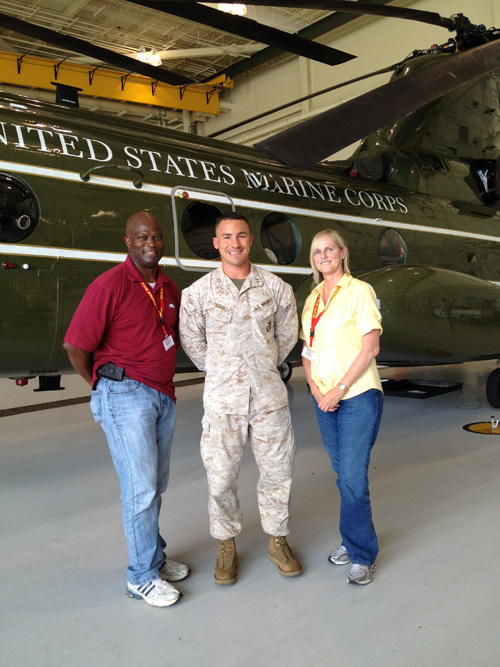
In a field in Quantico, Va., a group of university faculty and staff members listen to the details of their mission. They are a peacekeeping force in a turbulent country. As they set off on patrol, wearing heavy canvas vests and carrying fake rifles, they are met by a distraught citizen. The head of the government has been wounded, along with his wife and adult son. The peacekeepers can save only two of these three lives, and they have less than ten minutes to decide what to do.
This simulation is part of the Marine Corps’ 2012 OSO Educators Workshop. The workshop helps educators, including two participants from the University of Arkansas, understand more about the Marines and learn what kinds of students would be a good fit as officers in this branch of the armed forces.
“It really summarized what a marine’s training and life was like and what they were looking for in a recruit,” explained Carol Gattis, associate dean of the Honors College and an associate professor of industrial engineering. She and Thomas Carter III, assistant dean of student services and student affairs in the College of Engineering, attended the three-day workshop in July.
“They say they’re looking for the best of the best,” said Gattis, “But that doesn’t mean a 4.0. They’re looking for people who are problem solvers, who can learn quickly and react to a changing environment.”
Carter and Gattis both noticed that the Marines they came into contact with appeared very happy with their career choice. “We felt they were very passionate about what they did,” said Carter.
In addition to getting a taste of life as an officer in the Marines—rising early, wearing combat gear, eating MREs—Gattis and Carter got a first-hand look at what Marine officer candidates go through. They learned that becoming an officer in the Marines is physically and emotionally demanding. Candidates must complete ten mile runs with heavy packs and demonstrate their leadership skills through challenging exercises.
In one of the exercises Carter and Gattis observed, students had ten minutes to move a load of ammunition over a concrete wall without touching certain parts of their equipment. The students took turns acting as team leaders, and their leadership skills were evaluated by officers.
Gattis explained that this experience has changed her understanding of the type of students who might excel as Marine Corps officers. “Before, I would have thought the Marines wanted engineers and scientists, but they’re looking for any student with a bachelor’s degree. It can be in English or criminal justice or anything.” However, Gattis stressed that learning more about the Marine Corps has actually made her more selective about the types of students she would recommend. “The most important thing is being a leader and a problem solver who is able to handle the level of physical and emotional endurance that’s required,” she explained.
Students who are interested in the Marine Officer Candidate Course can contact Capt. Andrew Koch at Andrew.Koch@marines.usmc.mil.
Contacts
Camilla Medders, director of communications
College of Engineering
479-575-5697,